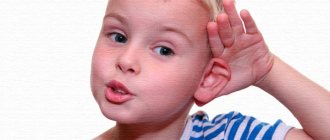But in fact, even before the child is one year old, the first prerequisites for mastering it appear.
From the first weeks of life, the baby masters passive speech, that is, understanding words, while most parents do not see the point in engaging in development from an early age.
They believe that they will not be able to teach anything, and this is of no use, since the child still does not understand anything.
Stages of baby speech development
In order to understand how to communicate with a baby, let's look at the main stages of speech development.
Achievements up to six months
The child masters passive speech from the first weeks of life , and it is from this moment that speech can begin to develop.
Right now, the main and very important task of parents will be to actively communicate with the baby.
This will be something of a daily job for both the parents and the baby himself.
New parents need to constantly voice the baby’s emotions, comment on all his movements and always talk to him.
- Around the second month of life, the child will learn to respond to the voice of an adult and will stop screaming and crying as soon as the parents talk to him.
- Already in the third month of life, the baby will begin to laugh and respond to you with sounds.
- At the 4th month, the baby begins to say aha and gurgle (singing sounds appear), at this moment actively participate in the dialogue, changing the intonation of your voice (find out more about when the child begins to gurgle and gurgle here).
- At 5-6 months, it is no longer a simple, familiar, melodious drawl that is heard, but a repetition of real syllables. Moreover, using sounds for which you have to close your lips, such as “b”, “p”, “m”, and also pronounces the syllables “ma”, “la”, “ba”, etc. At this time, the child is already beginning to listen to the sounds he makes, repeat them, imitate you and listen to your speech.
What can a baby do under 12 months?
After six months, in addition to the fact that speech consists of repetitions of syllables, the baby begins to babble. After he has gone through all the vowels of the alphabet, he begins to pronounce sounds such as “ba-ba-ba” or “da-da-da-da” together. The baby can also already answer a question, for example, “Where?” He will actively point his finger at the object.
What does a baby say from one year to two?
In one year, a child becomes a real researcher. He is interested in everything and asks questions in his own language. At 1 year of age, a child already uses 3-4 more or less understandable words , understands simple instructions, individual words and relates them to objects. As children age, their vocabulary increases.
At 1 year and 6 months, the vocabulary increases to 20 words and the baby can show one part of the body. By the age of 2, the vocabulary increases to at least 50 words , the child shows 3 parts of the body and already uses phrases of 2 words.
What can you do from 2 years old?
At this age, the child understands two-step instructions , for example, “Go to the closet, take a book,” “Go to the crib, take a toy,” and so on.
Typically, a child at this age has a vocabulary of at least 50 words and can show 5 parts of the body.
He also understands the meaning of actions in a given situation, for example, “What do you have in your hand?” “Is this your plate?” and so on.
The child always tries to answer the question.
Time for conscious pronunciation of words
All parents want to know when their child says “mama.” The time for conscious pronunciation of words varies for each child and is determined by the following factors:
- Gender (boys usually start speaking later than girls);
- Heredity;
- The presence or absence of abnormalities in the development of the palate and tongue (for example, speech development may slow down with a shortened frenulum);
- Features of the bite;
- Individual temperament of the child.
The physical well-being of the baby also plays a big role. Often sick children begin to speak later than their peers.
At what months are children ready to master the skill?
All parents eagerly wait for their baby to finally speak and want their speech to develop correctly and at the right time. Therefore, the most pressing question of all parents is “At what age do children begin to speak?”
Kids begin to speak at any age, and even if you ask a pediatrician, you won’t get a definite answer. If you start speech development from the first days of a baby’s life, your baby will start speaking by the age of one year.
Note! If your child doesn’t speak at one year, don’t panic right away. You need to contact a specialist so that the child is examined and you receive some advice.
Absolutely healthy children can talk at different times - on average from 1 year to 3 years. The very first words are, most often, “mom” and “dad”, as well as other simple words such as “give”, “go”, and so on. There is no clear age limit for the appearance of speech in children. This is what most experts think.
When does a newborn pronounce syllables?
From approximately 5-8 months, the baby begins to babble and pronounce the first syllables.
At this age, the child masters the elementary syllabic structure of a word, usually consisting of one syllable.
During this period, you need to talk to children as much as possible, thereby replenishing his passive vocabulary, which he will soon begin to use.
At what age should one begin to pronounce the first words consciously?
All children develop, of course, individually. At the age of 10 to 12 months, the child begins to consciously pronounce the first words. Usually these are monosyllabic words or words with repeated syllables.
When does a baby begin to learn the words mom and dad?
The child develops and grows very quickly, has already mastered a lot, has begun to pronounce sounds and syllables. But when will he say the long-awaited “mom”, “dad”? This usually occurs at the age of 1 year, but note that this is an approximate figure and all children are individual and develop differently.
Ready for phrases and sentences?
After babbling has replaced the first words, the next stage in the child's speech development is the development of vocabulary. The bearer of meaning during this period is not a simplified word, but intonation and rhythm. It is possible to understand what the baby wants to say only in a specific situation in which communication takes place and active gestures and facial expressions help him to do this.
At this stage, parents need to constantly talk with the child, read fairy tales, poems, and conduct active speech games in order to fill the child’s vocabulary inside and out.
Note! It is important not to “limp” with the child, but to pronounce all words correctly and without errors.
Also, focus on stressed syllables and so that the child can see the movement of the lips clearly and open the mouth wide. Correct articulation is a very important point in the development of a child’s speech. A child learns to compose sentences of three or four words until he is 3 years old. And at three years old he already forms interrogative sentences and adjectives and adverbs appear in his speech.
Useful tips
How to teach a baby meaningful speech? The mother should communicate more with the baby, talk constantly. For the baby, the native language is still unusual: he learns it as a foreign language. Therefore, active communication with the baby will help you master speech faster. Without this, the baby’s speech development will occur very slowly.
All mothers want to hear such a cherished word “mama” from their baby. How can I teach him to say this word?
There are some pretty simple practical tips:
- Accompany all your actions with the word “mother”: mother speaks, mother wants to teach, mother begins to feed her son;
- play the game “Where is Mommy?” – cover your face with your hands and ask the baby;
- when you stroke the child on the head, say: mother strokes her son (daughter);
- when the baby says a word meaningfully, repeat it after him and kiss him on the cheeks;
- when you say a word to teach a child, look into his eyes;
- If you want to teach your baby to say a word, repeat it more often.
Important! Always emotionally praise your baby for any achievements. It is very important.
How many times do you need to say the word “ma-ma” for your baby to start saying it? As many times as you like until you learn. Remember that even for an awkwardly pronounced word you need to joyfully praise the baby. Encouraging praise is an incentive for further development.
Are there differences between boys and girls
It is generally accepted that girls start speaking earlier.
This is due to the fact that they are most often calmer and unemotional, and there is no particular need for outside help.
Such children will quietly babble to themselves during an interesting activity, therefore, speech will develop earlier.
On the contrary, boys are more hot-tempered and noisy; in the early stages of growing up, they are characterized by loud screams, squeals and sudden movements.
Thus, by adhering to a more non-verbal way of expressing thoughts, their speech may be delayed.
Also, according to some studies, girls have a fairly plastic nervous system, thanks to which it is much easier for them to develop.
If the child does not speak
Each baby has its own development path. It depends on heredity, temperament and character, gender, developmental conditions and environment, daily routine and even nutrition. Some children start speaking later than others, and there is nothing wrong with that. This behavior is often typical for calm and phlegmatic children.
Experts note that boys, on average, begin to speak one to two months later than girls, but then catch up in a short time. In a bilingual environment, when two or more languages are spoken in the family, it is more difficult for the baby to perceive information, so he may start speaking later. In addition, the development of speech is negatively affected by a monotonous environment and insufficient communication with people. With a lack of communication and fresh impressions, the baby simply has nothing to talk about.
A serious reason for this behavior is stress, lack of emotional contact with parents and various psychological problems. If a child rarely sees and communicates with his mother, this negatively affects the emotional state and psychological development of the baby. Young children acutely feel tension and conflicts in the family. This also negatively affects the development and well-being of the baby.
The most serious causes are severe speech disorders, including aphasia, dysarthria, sensory and motor alalia. Medical problems include congenital anomalies and anomalies of intrauterine development, genetic diseases, and deafness. Such diseases require professional intervention and monitoring.
Causes of delayed speech development
Parents should never worry if their child is silent for a long time ; they should not compare him with other children.
Important! You can only worry when you reach three years of age, but only if the child is sick.
Experts have identified the following reasons for possible violations:
- Problems with the psyche, hearing, prolonged oxygen starvation in the womb. You should carefully monitor the baby’s health, because timely medical care will help resolve everything quickly, without any complications.
- Stress. If there are a lot of quarrels and conflicts in the family, the child may simply withdraw into himself. No one can instill in him the desire to talk in such a society. Therefore, parents also need to monitor the emotional state of the child.
- Lack of communication. Some parents, not wanting to send their child to kindergarten, make a big mistake. After all, for full development, a child must constantly be in society. There he can observe and repeat the words of his peers.
- Excessive parental care. Many of us are ready to guess and fulfill the child’s wishes at the first call, which is fundamentally wrong if you expect consistent speech from the child. He simply has no need to learn to speak, so in such families children utter their first words very late.
- Poor development of fine motor skills. Teach your child to daily evening massage and light finger training, because it is known that the part of the brain responsible for the speech apparatus is inextricably linked with motor skills itself. Drawing and clay modeling will be especially useful. At the same time, you can instill a love of art from early childhood.
- Mixed families speaking different languages. In such an environment, it is very difficult for a child to tune in and grasp the words and their meaning. After all, to do this, he must first choose a language in which he will learn to speak and distinguish the meaning of sentences.
Variants of the first words
Daily routine of a 5 month old baby
Statistics say that the first word in the vocabulary of 70% of children under one year old is “mom.” However, this is not at all necessary. Other options are also possible: “nanny”, “woman” or even “kisya” (if the baby is shown a cat every day and repeats its name). The first word can be any word, except those that contain consonant sounds that are difficult to articulate: “sh”, “sch”, “ts”, “r”. A young car lover can say “beep” for the first time; a girl, seeing a beautiful doll, can say “lala.” If the mother is often away, the baby may be the first to name the adult with whom he communicates most: these are grandmothers, aunts, brother or sister (“Anya”, “Lelya”, “Yulia”). Therefore, you should not wait for the child to say “mom”. Perhaps he will say a completely different word first.
In “children’s” language, the baby tries to name everything that interests him
Interesting. The baby's articulatory apparatus develops gradually. At first he pronounces only sounds (the so-called “humming”), then the consonants “m”, “n”, “l” are added to them, as the most convenient for pronunciation. Perhaps this is why the word “mother” sounds similar in all languages of the world - the sounds “m” and “a” are the easiest for a baby to pronounce.
How to help your baby speak faster
With the right support, every person is capable of much in their life. Good, well-delivered speech will need to be learned, but unwavering positivity and faith will help your child overcome all difficulties faster!
Exercises
So you can:
- Make time for reading. Take a book from the shelf with a short story and bright illustrations and spend the evening in the company of your child! Don’t be afraid to repeat the same text several times, because it is this approach that will allow words and expressions to become firmly entrenched in memory.
- Play songs and fun music. To improve hearing and word perception, a child needs to hear music in the house more often. Try to include more active and melodic compositions, while simultaneously developing auditory-motor coordination.
- Actively comment on your actions. Find a middle ground so you have time to listen to your baby and also tell him about everyday activities. Talk to him about everything, from important events to cooking dinner.
- Use simple and short phrases . Children learn from adults, carefully copying their actions. When you actively gesture, you teach your child to better understand the meaning of words. But do not forget also that it will be difficult for the baby to delve into long phrases, so at first it is better to limit yourself to something simple, for example, “bring a toy,” “sit down at the table,” and so on.
Maybe,
3-5 years
By the age of 3, the baby actively talks with adults and can ask and answer in long sentences of 5-7 words. He can say his name, age, and even address. It will be good to remember the book that was read to him
The child’s speech is full of verbs, adjectives, numerals and other words. The sentences themselves resemble the speech of an adult, but the endings are often broken and there are other lexical errors. The kid knows all the colors and pronouns well. Errors gradually disappear from speech. Speech skills improve and mature at 4-5 years of age.
Why are children now learning skills late?
There may be several reasons why many parents are forced to turn to a speech therapist. The main ones are:
- Indifferent attitude of adults to the problem. Leaving everything to chance is very risky. Parents should remember that hoping to overcome speech defects on their own may be worth long and expensive work with a specialist.
- Ecological situation. Polluted air and exhaust gases can significantly slow down a baby's development. As a result, you need to carefully monitor your diet, actively exercise, and take vitamins and minerals after consulting your doctor.
- C-section. Of course, many children are born in this way. And although experts do not observe dangerous pathologies, it is important to be prepared for the fact that children’s development may be hampered.
When to sound the alarm
- In the first months of life, the baby does not cry;
- At four to five months, the child does not gurgle, does not react to the appearance of his mother with animation or a smile;
- The baby does not listen to sounds;
- At seven to nine months, the child does not recognize the voices of his family, does not babble or repeat sounds or syllables;
- At one year old, the baby does not utter a single word and does not understand speech addressed to him;
- At 1.5 years old, the baby does not speak simplified and easy words, does not respond to comments and requests;
- At two years old, the child does not speak or speech is indistinguishable, the baby cannot fulfill the request.
If you notice such deviations in the development of your child, be sure to consult a doctor.
It is necessary to check the hearing and the degree of development of mental functions and skills. Visit a pediatric neurologist and otolaryngologist, speech therapist and psychologist. For a detailed calendar of child development by month, what and when a baby should be able to do, see the link. Subscribe to our VKontakte group
Recommendations for parents with speech pathology
Deviations can be noticed by kindergarten teachers, parents or a pediatrician. It is very important for parents to observe the child themselves and read more books about the development of preschoolers. The main principle in diagnosis is regular visits to the pediatrician. During the first year, you should go to the pediatrician every month. In the second year of life, the child is brought to the doctor once a quarter. The pediatrician will definitely see the pathology and tell the parents about it.
If there is a delay in speech development, you should contact a neurologist and speech therapist. Specialists will refer you for an examination to identify the cause of the disease. The speech therapist will conduct a speech therapy examination, begin classes, and give recommendations to parents on working with their preschooler at home.
The earlier disorders of speech and general development are identified, the easier it is to eliminate the pathology.
Consultation with a speech therapist is required for healthy children from the age of 3, and then annually until the age of 7. If deviations are detected earlier, specialist help is indicated before the age of 3.










